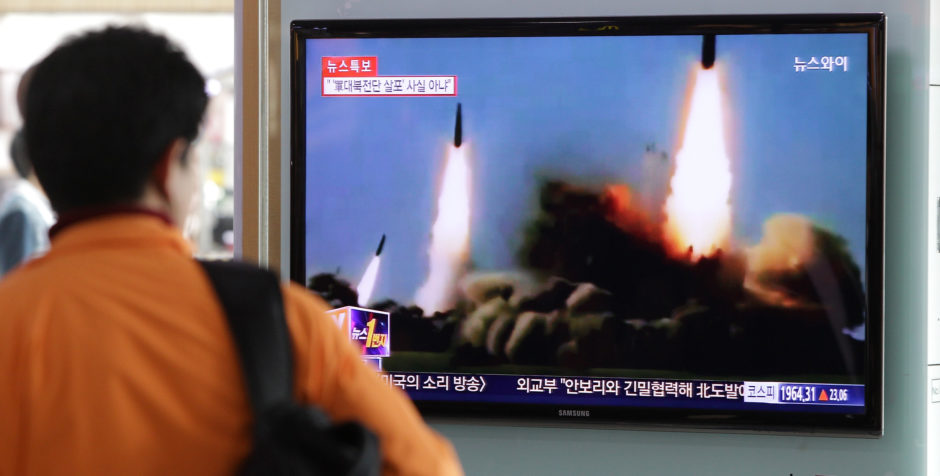North Korea's Strategic Gamble
Late Monday North Korea launched yet another ballistic missile, in clear violation of United Nations sanctions and in defiance of U.S. attempts to resolve issues with the rogue nation through diplomatic means. However, this latest North Korean provocation was more serious, as the missile flew directly over Japan, causing that nation to send a civil defense message to its citizens to seek cover. A perturbed Japanese Prime Minister Abe called for an emergency meeting of the U.N. Security Council. (More on this and other North Korean violations of U.N. sanctions here.)
In response to this latest North Korean provocation, the Republic of Korea (South Korea) tested a new missile with an 800-kilometer range and launched four F-15 fighter aircraft along the Demilitarized Zone (DMZ) in a simulated attack on North Korea with the notional goal of “completely destroying the enemy’s leadership,” according to the Republic of Korea’s Yonhap News Agency. South Korea’s new president, known for his desire to negotiate with the North, as a contingency ordered his military to prepare an “aggressive wartime action plan” to fight a rapid and decisive war with its enemy across the border. Tensions are high on the Korean Peninsula.
President Trump, in a prepared statement, condemned the North Korean missile launch and repeated that “all options are on the table” as possible responses to Kim Jong Un’s reckless act.
North Korea’s latest missile launch represents a strategic gamble by Kim Jong Un. His behavior has been conditioned by decades of North Korean aggression committed with impunity. North Korea’s violations of the 1953 Armistice that placed the Korean War on hold are replete. These acts have included killing U.S. service members, capturing a U.S. Navy ship and its crew, sinking a South Korean ship last year, detonating nuclear devices, ramping up its ballistic missile program and more. Kim is betting that America and its allies will protest, perhaps increase sanctions and do virtually nothing else. He may be right. He could also be very wrong.
What does Kim’s behavior mean? What is he thinking?
On the one hand, Kim may be counting on the United States to be hamstrung by its desire for peace and its aversion to mass civilian casualties in and around the capital city of Seoul. He may be figuring that the U.S. will not take any military action, with the result that he keeps his nuclear weapons and continues to work on developing nuclear ICBMs. He may not see America and its allies as a true threat. That is one analysis.
Another analysis concludes that, in fact, Kim is trying to provoke a war with the United States. One might ask, why would he do such a thing when the inevitable result would be the overwhelming defeat of North Korea and the end of his regime? The answer is: Because he does not believe that. Perhaps he believes that North Korea, at the very least, would inflict great harm on U.S. and South Korean forces and eventually settle on a ceasefire that would be to the benefit of his country, not unlike the results of 1953. There are often practical and strategic gains to be garnered, even in the face of a momentary military defeat.
Before we dismiss this second possibility, consider the conduct of another diabolical dictator, Sadaam Hussein. Though Iraq’s military power was dwarfed by the capabilities of the United States, to say nothing of the combined military might of the coalition that stood against him---Sadaam Hussein went to war with the U.S. and its allies not once---but twice! Was he insane? Not any more than Kim Jong Un. Rather, the Iraqi dictator believed that armed conflict with the United States would eventually end to his benefit, one way or the other. He believed that a military victory over the U.S. was tactically possible, even if improbable. Sadaam also believed that the United States did not have the stomach for an extended fight that produced dead American Soldiers. But even if that failed, he also counted on strategic and geo-political gains, even if his army was ultimately defeated in battle. Negotiations to end a fight with the U.S. would possibly ease sanctions and provide economic and humanitarian relief to Iraq. It was a calculated gamble on the part of Sadaam Hussein.
While we do not know definitively what Kim is thinking and while his strategic calculus is difficult to decipher, one of the above two analyses is, more than likely, the correct one. Either strategy on the part of North Korea’s dictator represents a course of action that will not end well. Under his leadership, North Korea is an immediate threat to Japan, South Korea, and the American forces in the region. It is a long-term threat to the continental United States and the safety of millions of its inhabitants. These threats are very real.
President Trump and his National Security Council, as well as his senior military leaders, are confronted with daunting decisions. We pray, literally and figuratively, that they are imbued with wisdom, as well as courage, to face this threat.
